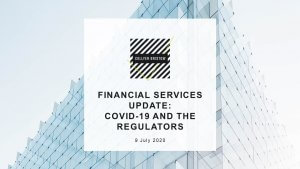- Banking & financial disputes

Shorter Reads
Amigo sub-prime lender scheme of arrangement rejected by court
The High Court has agreed with the FCA to reject a scheme of arrangement proposed by subprime lender Amigo, on the grounds that the compensation scheme it proposed to deal with complaints of misselling was not fair.
1 minute read
Published 26 May 2021
Key information
- Specialisms
- Dispute Resolution
- Services
- Banking & financial disputes
The High Court has agreed with the FCA to reject a scheme of arrangement proposed by subprime lender Amigo, on the grounds that the compensation scheme it proposed to deal with complaints of misselling was not fair.
This is a summary of the facts:
- Amigo provides loans to those who would not be able to borrow from mainstream lenders. Amigo requires the loans to be guaranteed by a guarantor with a stronger credit profile.
- Amigo’s problems arose from accusations of unaffordable or unsustainable lending for which customers are entitled to compensation under FCA rules. It had to make a £150m provision for this and the company’s financial difficulties have been compounded by the pandemic.
- Amigo proposed a redress scheme for complaining customers, estimating that they would receive about 10p in the pound. It has sought to bind in these creditors by means of a scheme of arrangement.
- The court agreed to a creditors’ meeting to be held to vote on the scheme.
- Amigo stated that if the scheme were not approved, it would have to go into administration. Of those voting, 95% voted in favour (but this was only about 8% of over 900,000 customers).
- The FCA opposed the scheme at the second court hearing required to sanction it.
- The FCA’s view was that if the scheme were not approved, the likely outcome would be a revised scheme rather than insolvency.
- The FCA objected to the scheme because of the low percentage of unsecured creditors voting on the scheme and because they were receiving such a low percentage in terms of compensation while the shareholders were losing nothing.
The court accepted the FCA’s arguments and refused to sanction the scheme. It was not a scheme which a creditor could reasonably accept as fair. The creditors were consumers and were not given sufficient information by Amigo to be able to assess whether what was being presented to them was a fair scheme.
This is an interesting decision as it shows the current pressure on the subprime lending market. Another high cost lender, Provident Financial, is also seeking to restructure because of rising complaints. We should expect to see other similar lenders seeking to restructure because of the pandemic (but at the same time there will no doubt be more customers seeking access to alternative finance for the very same reason).
It also shows that the FCA will intervene to prevent a regulated lender from proposing a scheme which would have the effect of binding customers into a low level of compensation where there is no evidence that the alternative is for the company to imminently collapse. It will be interesting to see what will happen now. Amigo’s shares fell 60% today on the news of the court’s decision – either the court is right and Amigo will present a revised scheme or it is wrong and it will be forced into insolvency, in which case the customers will receive nothing.
Related content
Shorter Reads
Amigo sub-prime lender scheme of arrangement rejected by court
The High Court has agreed with the FCA to reject a scheme of arrangement proposed by subprime lender Amigo, on the grounds that the compensation scheme it proposed to deal with complaints of misselling was not fair.
Published 26 May 2021
Associated sectors / services
Authors
The High Court has agreed with the FCA to reject a scheme of arrangement proposed by subprime lender Amigo, on the grounds that the compensation scheme it proposed to deal with complaints of misselling was not fair.
This is a summary of the facts:
- Amigo provides loans to those who would not be able to borrow from mainstream lenders. Amigo requires the loans to be guaranteed by a guarantor with a stronger credit profile.
- Amigo’s problems arose from accusations of unaffordable or unsustainable lending for which customers are entitled to compensation under FCA rules. It had to make a £150m provision for this and the company’s financial difficulties have been compounded by the pandemic.
- Amigo proposed a redress scheme for complaining customers, estimating that they would receive about 10p in the pound. It has sought to bind in these creditors by means of a scheme of arrangement.
- The court agreed to a creditors’ meeting to be held to vote on the scheme.
- Amigo stated that if the scheme were not approved, it would have to go into administration. Of those voting, 95% voted in favour (but this was only about 8% of over 900,000 customers).
- The FCA opposed the scheme at the second court hearing required to sanction it.
- The FCA’s view was that if the scheme were not approved, the likely outcome would be a revised scheme rather than insolvency.
- The FCA objected to the scheme because of the low percentage of unsecured creditors voting on the scheme and because they were receiving such a low percentage in terms of compensation while the shareholders were losing nothing.
The court accepted the FCA’s arguments and refused to sanction the scheme. It was not a scheme which a creditor could reasonably accept as fair. The creditors were consumers and were not given sufficient information by Amigo to be able to assess whether what was being presented to them was a fair scheme.
This is an interesting decision as it shows the current pressure on the subprime lending market. Another high cost lender, Provident Financial, is also seeking to restructure because of rising complaints. We should expect to see other similar lenders seeking to restructure because of the pandemic (but at the same time there will no doubt be more customers seeking access to alternative finance for the very same reason).
It also shows that the FCA will intervene to prevent a regulated lender from proposing a scheme which would have the effect of binding customers into a low level of compensation where there is no evidence that the alternative is for the company to imminently collapse. It will be interesting to see what will happen now. Amigo’s shares fell 60% today on the news of the court’s decision – either the court is right and Amigo will present a revised scheme or it is wrong and it will be forced into insolvency, in which case the customers will receive nothing.
Associated sectors / services
- Banking & financial disputes
Authors
Need some more information? Make an enquiry below.
Subscribe
Please add your details and your areas of interest below
Article contributor
Robin
HenryPartner - Head of Dispute Resolution Services
Specialising in Banking & financial disputes, Commercial disputes, Corporate recovery, restructuring & insolvency, Financial regulatory and Personal insolvency
Enjoy reading our articles? why not subscribe to notifications so you’ll never miss one?
Subscribe to our articlesMessage us on WhatsApp (calling not available)
Please note that Collyer Bristow provides this service during office hours for general information and enquiries only and that no legal or other professional advice will be provided over the WhatsApp platform. Please also note that if you choose to use this platform your personal data is likely to be processed outside the UK and EEA, including in the US. Appropriate legal or other professional opinion should be taken before taking or omitting to take any action in respect of any specific problem. Collyer Bristow LLP accepts no liability for any loss or damage which may arise from reliance on information provided. All information will be deleted immediately upon completion of a conversation.
Close









































































